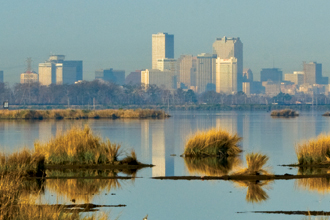Panel discussion addresses poverty in New Orleans
Poverty is sometimes difficult to perceive from the vantage point of the manicured grounds and stone facades at Tulane University, but it is nonetheless a chronic and crippling reality for some New Orleans neighborhoods. On Tuesday (March 12), a frank conversation about the impact of poverty on the poor was heard on campus during the “Poverty in Our Community” panel sponsored by the Tulane Center for Public Service.

Orleans Parish has a poverty rate of 27.4 percent, 12 percent above the national average. (Photo by Paula Burch-Celentano)
Petrice Sams-Abiodun, executive director of the Lindy Boggs Community Literacy Center at Loyola University, the individual issues of literacy, homelessness and reproductive health should not be viewed as the problem.
“These issues just point to deeper systemic issues rooted in poverty and racism.” The question to be asked, she said, is “How do we change systems so they work for low-skilled and illiterate people?”
As an academic, tools at her disposal include research and data generated at the university. "But we do it for social change and around issues of social justice,” she said.
For James Kelly, executive director of Covenant House, a shelter for homeless children, it's not the poor who are the problem (as some policy perspectives suggest), but rather a set of institutions with little latitude for the traumas homelessness, incarceration, violence that can scar and hold back those from impoverished backgrounds.
“These are tough kids,” said Kelly. “They have to be to survive. But they're good kids, great kids, and if you come into work and see a kid as bad, it's time for you to quit.”
Cody Wild is a Tulane junior majoring in economics.
